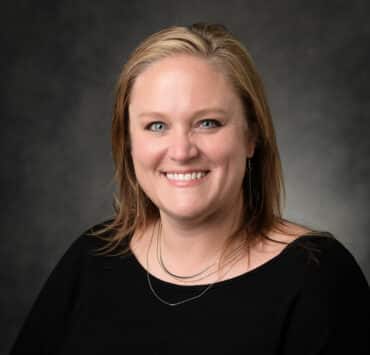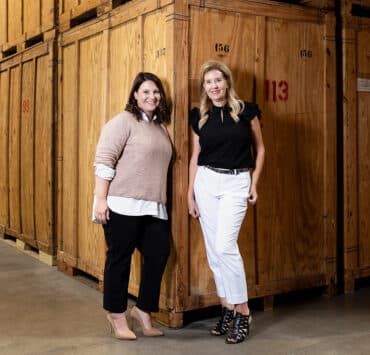In one of her first meetings at Moog, Kristine Karnath sat quietly and listened. She remembers being the least senior person in the room and the youngest; she figured didn’t have much to add. But one of her colleagues in HR quickly pointed out that Moog operated differently than other companies.
“She said: ‘You were invited to the table. We want to hear what you have to say,’” Karnath recalls. “This is a very comforting, trusting environment, and there’s not a lot of hierarchy when it comes to getting your voice heard.” That invitation would guide her work at Moog, bringing creative HR and benefits solutions to a unique global business. Eighteen years later, she serves as US director of benefits.
The global engineering and manufacturing organization provides solutions for aerospace, defense, industrial, and medical operations. The company employs about seven thousand people in the US (close to 13,000 globally), 40 percent of them in manufacturing. A leader in precision motion control products, they develop and integrate avionics, engine controls, servomotors, and medical pumps.
“This is a very comforting, trusting environment, and there’s not a lot of hierarchy when it comes to getting your voice heard.”
Kristine Karnath
Kristine Karnath grew up in Buffalo, New York, where Moog is well-known as a desirable employer. She studied finance at the University of Buffalo, aiming to land a steady job among plentiful opportunities. Her first role out of college was at a bank, where she was introduced to benefits. She didn’t know what to expect, but soon she came to appreciate the importance of the work to a company and its people.
“You have the ability to help people and have an impact on their lives; you also have the ability to impact the organization, because it’s such a huge cost,” she explains. “You can be really creative and do some out-of-the-box things, but you have to understand what drives costs and behavior.”
One of her key achievements has been the implementation of Moog’s unlimited vacation policy. Since 2019, the Moog family of companies has offered unlimited vacation days to full-time employees, reinforcing the organization’s status as an attractive employer and sending them toward the forefront of benefits innovation. Designing and implementing this policy was no simple feat, but it proved the most elegant way to cut through a tangled set of PTO policies.
“You can be really creative and do some out-of-the-box things, but you have to understand what drives costs and behavior.”
Kristine Karnath
Moog had acquired a number of organizations and traditionally left them to continue operating autonomously, Karnath recalls. Eventually this led to twenty-nine different time-off policies. Employment wasn’t equal from one site to another, so Karnath’s director of HR resolved to implement a single policy. The key limitations were that this policy could not reduce anybody’s benefits, but also could not increase costs.
“We took about nine months with focus groups and a steering committee to dig into why this could work and, importantly, why it wouldn’t work,” she explains. “At the end of the nine months, we realized that because of the culture we have, this really could work.”
Trust is a pillar of Moog’s company culture. Founder Bill Moog believed people want to work well and succeed together, so the company has never used timecards. The unlimited vacation policy builds from that trust, reducing administrative burdens without negatively affecting productivity.
Kristine Karnath recalls that people would ask what other companies were doing the same thing. “My response at the time was, ‘I don’t know of anyone like us who has done it,’ and that would make people nervous,” she says. “But I said: ‘That’s what makes us awesome. We don’t need another company to show us that this can be done.’”
“We don’t wait for someone else to figure it out, and that’s a big shift in mindset. We’re an innovative company.”
Kristine Karnath
Moog employees also receive access to onsite wellness centers. These medical facilities offer routine care like physicals, sick visits, and vaccinations, as well as eye exams, physical therapy, nutrition counseling, and an onsite pharmacy. Services are available exclusively to employees and dependents for low or no cost.
These facilities save money for the company, as well as the patient; the company’s healthcare spend per employee has been stagnant or declining since 2009, while services expand. Prior to that, costs had been rising and unpredictable.
“We had huge swings in medical, but this way, we could look into the root causes of the cost increases and tame them by offering services on-site,” Karnath says. “We are not proponents of shifting costs to employees—we want good quality care that’s convenient, that saves time.” The costs to Moog are fixed; for example, providers are paid by salary, not per visit. This enables patients to receive as much treatment as they need.
Eighteen years in, Kristine Karnath appreciates how support operations at Moog have become more proactive and creative. Where the company used to follow established examples, now they take informed risks toward fresh solutions. “We don’t wait for someone else to figure it out, and that’s a big shift in mindset,” she says. “We’re an innovative company. Support services like HR should follow that.”

